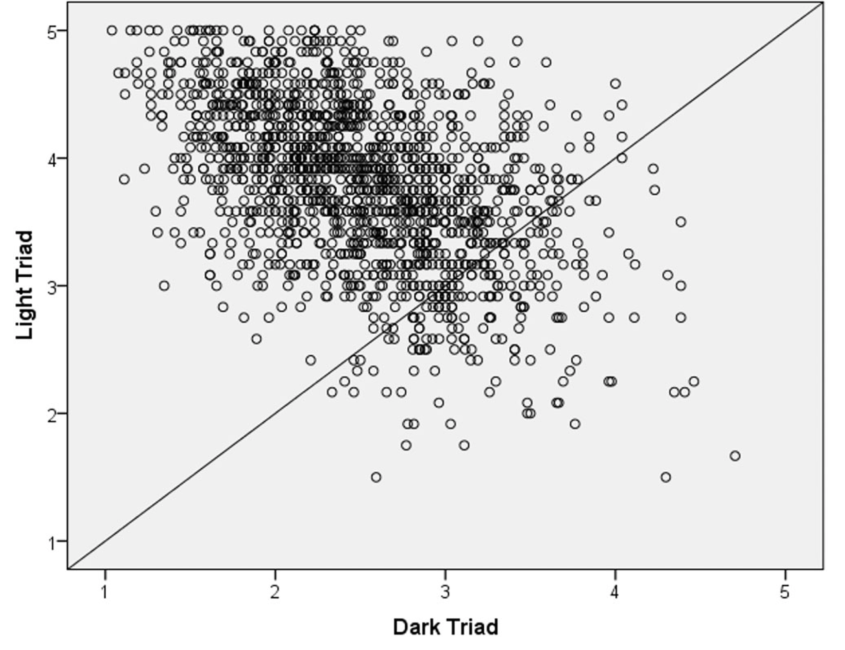Psychopaths And Narcissists Have Hogged The Limelight, Now It’s Time To Explore The Saintlier Side Of Human Personality, Say Researchers, As They Announce A Test of The “Light Triad” Traits
March 22, 2019
Christian Jarrett for Research Digest
Psychologists have devoted much time over the last two decades documenting the dark side of human nature as encapsulated by the so-called Dark Triad of traits: psychopathy, Machiavellianism, and narcissism. People who score highly in these traits, who break the normal social rules around modesty, fairness and consideration for others, seem to fascinate as much as they appall. But what about those individuals who are at the other extreme, who through their compassion and selflessness are exemplars of the best of human nature? There is no catchy name for their personality traits, and while researchers have studied altruism, forgiveness, gratitude and other jewels in our behavioural repertoire, the light side of human personality has arguably not benefited from the same level of attention consumed by the dark side.
Writing in the journal Frontiers in Psychology, a team led by US psychologist and author Scott Barry Kaufman at Barnard College, Columbia University says it is high time we redressed this imbalance. “Too much focus on one aspect of human nature at the expense of the other misrepresents the full capacities of humanity,” they write. Through four studies featuring more than 1,500 online participants, Kaufman and his team have created a new questionnaire that taps what they are calling the Light Triad (see example items below, and you can take the test online). They’ve also provided preliminary evidence for the kind of personal characteristics and psychological outcomes that are associated with being a high scorer on the light side of personality – or what they call an “everyday saint”.
The research involved participants rating their agreement with statements designed to tap into the more positive, compassionate and selfless aspects of human personality. Kaufman’s team took inspiration for these items from surveys used to measure the Dark Triad, but they made sure that their new items were not simply the Dark Triad questionnaire items in reverse; they also sought advice from experts in positive psychology and personality psychology to help them with the compilation. Participants also completed established measures of the Dark Triad, of the Big Five personality traits, and various other measures of psychological outcomes, well-being, values and characteristics.
The new 12-item Light Triad scale that the researchers settled on after removing redundant items taps three light traits: Kantianism (“treating people as ends unto themselves, not as mere means to an end”, as measured by agreement with statements like “I don’t feel comfortable overtly manipulating people to do something I want”); Humanism (“valuing the dignity and worth of each individual”, as measured by agreement with statements like “I tend to treat others as valuable”); and Faith in Humanity (i.e. “believing in the fundamental goodness of humans”, as measured by agreement with statements like “I think people are mostly good”).
The participants’ scores on the Light Triad traits were negatively correlated with their scores on the Dark Triad traits, but only modestly, suggesting that each is not merely the mirror opposite of the other, and that we all have varying levels of both light and dark traits. On an uplifting note, Kaufman and his colleagues found that their participants’ scores were skewed more towards scoring higher on the Light Triad than the Dark (see below). “Extreme malevolence was rare in the samples we studied,” they write.
Overall, and consistent with past research, younger participants, men, those motivated by power, sex, and selfish ambitions, were more likely to score higher on the Dark Triad. In turn, high scorers on the Dark Triad also tended to score lower on life satisfaction, agreeableness, self-transcendent values, compassion, empathy and belief in the good of humanity. More advantageously (in certain contexts), higher scorers on the Dark Triad also reported more casual sexual partners, greater creativity, bravery, assertiveness and leadership.
On the other hand, older people, women, those with more stable childhoods, and the more religious and spiritual, tended to score higher on the Light Triad. In turn, scoring highly on the Light Triad was associated with various appealing and beneficial sequelae, such as higher life satisfaction, relationship satisfaction, feelings of autonomy and competence, higher conscientiousness, compassion, empathy, openness, humility and belief in the goodness of others.
There were also some possible downsides of being too much of an “everyday saint”, such as having weaker motives for achievement and self-enhancement (potentially impeding the pursuit of self-actualisation, or being the best version of oneself); a proclivity for interpersonal guilt; and excessive trust and compassion that could leave one open to exploitation. Overall, though, Kaufman and his colleagues said that scoring higher on the Light Triad than Dark is associated with a greater quality of life, and they added “we believe that Light Triad individuals are more enjoyable to be around and likely to exert a more positive net effect on the world.”
The researchers do stress that this is exploratory work. It involved participants from mostly the US and UK, and relied almost exclusively on people rating themselves. There was one exception – an economic game, in which higher Light Triad scorers were, unsurprisingly, more generous to others.
I also put it to lead author Scott Barry Kaufman that sceptics may accuse his team of falling for the “jangle fallacy” – that is, relabelling the existing, well-established psychological concepts of agreeableness (a Big Five trait) and humility and honesty (from the HEXACO model of personality). Kaufman said it’s fair to suggest that the Light Triad traits are facets of agreeableness, but he believes there is value in digging deeper into these facets or sub-traits, as well as finding ways to measure them, so as to better predict outcomes that would be missed by only measuring the main, overarching positive personality traits.
“What I believe the light triad captures, and is not fully represented by existing facets of agreeableness, is a fundamental humanistic worldview, which includes a belief in the fundamental goodness of humans, and the motivation to treat individuals as valuable and worthy, regardless of what they can provide for you personally,” Kaufman added. “We live in such a world where everyone thinks their own problems and causes are more important than everyone else’s central causes, and we have lost an appreciation for the fundamental dignity of each other, even if they have very different political beliefs or come from a very different culture. The light triad worldview is desperately needed in the world today.”
Given this need, as well as the positive characteristics and wellbeing measures that the new research suggests is associated with scoring highly on the Light Triad, I also asked Dr Kaufman if there is anything the less saintly among us can do, to try to drag our personality traits out of the shadows and into the light. “Interventions that shift perspective, and increase a sense of universal love and self-transcendence,” could have this effect, he said. “This could include engaging regularly in a loving-kindness meditation, using new virtual reality technologies to engage in self-transcendent experiences (see David Yaden’s work) – such as awe (e.g., viewing images that are beautiful or inspiring), and even intentionally engaging in the perspectives of others that are very different from ours with rational compassion (see Paul Bloom’s work), curiosity, and loving-kindness.”
Increasing self-compassion could be another route to increase Light Triad traits, Kaufman added, considering the strong correlation he and his colleagues found “between thinking that one’s own self is good and thinking that others are basically good”.
Kaufman and his colleagues, David Yaden, Elizabeth Hyde and Eli Tsukayama, conclude their new paper by acknowledging that the Dark Triad traits are certainly worthy of study when you consider the harm, at an individual and societal level, that is caused by high scorers on these traits. “However,” they write, “we believe that the light side of personality is also worth understanding. We hope that the current investigation stimulates further research on the good that those with Light Triad characteristics create in the world.”
—The Light vs. Dark Triad of Personality: Contrasting Two Very Different Profiles of Human Nature [the new paper published in Frontiers in Psychology]
—The Light Triad vs. Dark Triad of Personality [Scott Barry Kaufman introduces his findings at his Beautiful Minds blog at Scientific American Mind]
—Take the new Light Triad test [the free test also tells you the balance of your Light and Dark Triad traits]
Christian Jarrett (@Psych_Writer) is Editor of BPS Research Digest and the author of a forthcoming book on personality change




